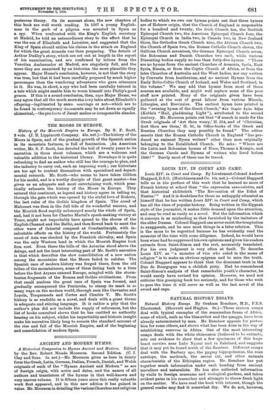A Historical Companion to Hymns Ancient and Modern. Edited by
the Rev. Robert Maude Moorsom. Second Edition. (C. J. Clay and Sons. 5s. net.)—Mr. Moorsom gives us here in dainty form the Greek, Latin, German, Italian, French, Danish, and Welsh originals of such of the "Hymns Ancient and Modern" as are of foreign origin, with notes and dates, and the names of all authors and translators of the hymns in that well-known and very uneven volume. It is fifteen years since this really valuable work first appeared, and in this new edition it has gained in value. Mr. Moorsom in detailing the various Churches and religious bodies to which we owe our hymns points out that three hymns are of Hebrew origin, that the Church of England is responsible for a hundred and twenty, the Irish Church ten, the Scottish Episcopal Church two, the American Episcopal Church four, the Episcopal Church in India two, in Canada two, in New Zealand three, the Orthodox Greek Church nine, the African Church two, the Church of Spain two, the Roman Catholic Church eleven, the Gallican Church seventeen, the German Episcopal Church seven, the Bohemian and Danish Churches two each, while various Dissenting bodies supply no less than forty-five hymns. "There are no hymns from the ancient Churches of Armenia, Syria, East Syria, Russia, or from the Coptio Church of Africa, or from the later Churches of Australia and the West Indies, nor any written by Converts from heathenism, and no ancient Hymns from the Early Brito-Celtic Church of Ireland, and Wales and Scotland, in the volume." We may add that hymns from most of these sources are available, and might well replace some of the poor stuff now printed. Many of the originals given have been gathered at the cost of great labour from various Missals, Liturgies, and Breviaries. The earliest hymn here printed is the "evening hymn of the Greek Church," 4,ies lhapbv lrytas 56tas (Keble's "Hail, gladdening Light "), attributed to the second century. Mr. Moorsom points out that "if search is made for the Greek originals of 'Art thou weary,' H. 254, and of Christian, dost thou see them,' H. 91, in Office-books of the Greek and Russian Churches they may possibly be found." The editor asserts that the Roman Catholic Church in England "has pro- duced no eminent Hymn writers" other than men originally belonging to the Established Church. He asks : "Where are the Latin and Bohemian hymns of Huss, Thomas a, Kempis, and the German Carols and Hymns of writers who lived before 1500?" Surely most of these can be traced.


























































 Previous page
Previous page